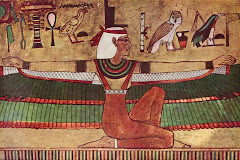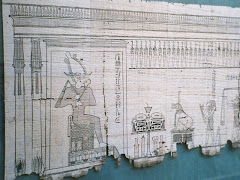Tuesday, June 9, 2009
The Amazons, Asherah, and The Search for Atlantis
(National Geographic Channel Episode)
Riddles of the Dead: The Amazon Warriors
“Men who are warriors do not gain much attention. Women warriors, on the other hand, become the stuff of legends.” There was a feature on the National Geographic channel, Riddles of the Dead, about the Amazon warriors. They were fierce, beautiful, blonde women who refused to be conquered by men. They raised their male children as slaves and trained their women to be warriors. The myth of the Amazons continues to inspire many stories, even up to today.
It was said that the Amazons fought on the side of the Trojans during the war against Achilles and the rest of the Greeks. Achilles is said to have killed the Amazon Queen Penthesilea in a fierce battle, and another Queen, Hippolyta, possessed the girdle that was one of the labors of Hercules. An archaeologist investigating a 3000-year-old burial in Southern Russia discovered that it contained the skeleton of a (according to an anthropologist) woman in a nomadic warrior’s pose—one leg straight, the other bent. Along with this were hundreds of arrowheads, golden beads, and golden emblems of a priest/ess. They figured that the woman (later confirmed to be so by DNA testing) was a nomadic warrior priestess. Coincidentally, studies showed that Southern Russia was where the Amazons were most likely to have gone after they were displaced by external factors. It seemed that the Amazons were not only simply “myth” after all.
(The Amazons, or Androktones—Killers of Men, are now the newest subjects of my feminist research.)
Women like them, who have defied order and “traditional” gender roles, are definitely interesting. They show us that the line we draw between capabilities of men and women somehow do not really have to exist. I think gender roles are really a way of keeping the stability in society. Humans are creatures of routine, and if there was too much variety the world would be more complicated. Or would it? Do these roles really simplify things? There was a time when gender roles were a question of pragmatism and not of bias. That is not always the case today.
For starters, gender roles are unfair. They constrict and they divide. They serve to separate things that should not have boundaries. These boundaries are based on the assumption that men and women are intrinsically different, and there are some things that only men can do and vice versa. It is assumed that there are some things that only women can do. With the exception of childbirth and other biology-related aspects, this is really not true.
Gender roles then extend to Dating Scripts. There was an episode on The Tyra Banks Show related to this. The topic was a woman who could not seem to get dates because of her “bad dating habits.” Some gay men were on the show to give her the “straight” dirt. It was amusing because these gay men showed the women what to wear, what to say and what not to say on a first date, and claimed to know what men really think. Dating scripts are another way to keep the stability. What is it that people have against spontaneity anyway? Some of the frequent advice given to women for first dates are: Don’t reveal too much; be approachable; eat light; show genuine interest in your date, etcetera. Which begs the question: Why? What if you don’t want to eat light? What if you’re not genuinely interested? Why do we allow ourselves to be governed by these scripts?
I should probably mention a certain bestseller I extremely abhorred due to it being a proponent of gender roles: Meyer’s Twilight. That requires twelve more pages of criticism, so I won’t elaborate.
Random Observations: In a traditional couple scene, the woman holds on to the man, not the other way around. And when it comes to holding the umbrella, the man holds it for the couple—even if it was the woman’s umbrella to begin with. And the whole business with the man carrying the purse (emphasis on the “purse,” it often being of no weight at all) of the woman: what in the world is that supposed to mean? If the world were gender aschematic, we’d all have a lot more freedom to do whatever we want. Not to sound like an anarchist, but the unwritten gender roles can be suffocating.
"The basic options of an individual must be made on the premises of an equal vocation for man and woman founded on a common structure of their being, independent of their sexuality." (Simone de Beauvoir, La Deuxieme Sexe)
(Discovery Channel DVD Episode)
Archaeology II – The Forbidden Goddess
Was it a battle of the sexes, or was it a battle for power, gender regardless?
Maybe it was both.
In ancient Israel a few thousand years ago, there were two main divine beings: Yahweh and Asherah. Yahweh was the almighty ruler, Asherah was his consort, and was the mother goddess.
With the subsequent editing of the bible, Asherah was scratched out and Yahweh rose to the rank of “only” god. Everything else is simply labeled a false idol.
Scholars today only know of Asherah through physical evidence unearthed by archaeologists. (Statues, icons, sculptures.) There are also some surviving texts in which she is mentioned as “Yahweh’s Asherah.”
There are two reasons considered for the deletion of the goddess and the phasing out of her cult. One, the high priests and officials of Israel, male, wanted the god to reflect them, and saw no room for a woman. (Gender studies show that while men are fascinated by women and their ability to reproduce, they are also threatened by this power.) Two, the high priests and officials of Israel saw her as a threat to Yahweh’s seat as most powerful divine being, and saw no room for any other divine being, woman or otherwise.
The episode made some old questions rise from the murky confines of my subconscious, somehow connected, but not exactly about it.
Disclaimer: I am an agnostic.
Note: Agnostic is not Atheist, and while we’re on the subject, Atheist is not Satanist.
One: Why do we refer to god as “he”? Is there any conclusive evidence to suggest that “he” is male? Following the logic at the very beginning, if god made humans in his own image and likeness, then isn’t it more likely that he was both male and female? He created both genders after all. (Tangent: How many genders are there, really?)
Two: “God has a face, hands, feet from time to time, but how about below the waist? There is no mention of genitalia anywhere.” It’s almost as if they’re denying physical evidence of god’s sexuality while asserting it through pronouns.
Three: How do we know that there is only one god, and that there are not multiple divine beings? (This will probably never be answered anyway.)
Four: I know that the bible is considered the absolute truth in a lot of circles. But why? It’s literature. It does not provide a conclusive account of how things happened. How can it? Every piece of work, written or otherwise, is reflective of the time and place in which it was created and, more importantly, who created it. The specific details cannot be held true for all time and for all people. It also has gone through revision after revision, translation after translation. How many sentences come out with a different meaning after being translated? And how many things get lost in revision? It does not provide an unbiased account of history, it is an insight into the people who wrote it and how they lived and believed.
"The bible is literature, not dogma." - George Santayana
P.S.The story of Asherah shows that history is written by the winners. The losers have no place in it except to be in the wrong, or to have no place in it at all.
(Discovery Channel DVD Episode)
The Search for Atlantis
I'll keep this one short.
Humans have always been fascinated by the unknown. It is not by coincidence that the mystery of Atlantis has survived the test of time, and that people, despite all failure and disappointment, still believe that one day, Atlantis will be found.
Some researchers say that it's on Bimini Island in the Bahamas.
Some say that it will never be found, because through time, and following geological patterns, it has been pushed under the Caribbean plate.
I think that the mystical Lost Island represents more than just thrill and treasure. It seems that no matter how much we progress, we will always feel the need to look back to where it all began. If only to see how far we've come.
If Atlantis does get found someday, I sincerely hope I would still be around to see it.
Riddles of the Dead: The Amazon Warriors
“Men who are warriors do not gain much attention. Women warriors, on the other hand, become the stuff of legends.” There was a feature on the National Geographic channel, Riddles of the Dead, about the Amazon warriors. They were fierce, beautiful, blonde women who refused to be conquered by men. They raised their male children as slaves and trained their women to be warriors. The myth of the Amazons continues to inspire many stories, even up to today.
It was said that the Amazons fought on the side of the Trojans during the war against Achilles and the rest of the Greeks. Achilles is said to have killed the Amazon Queen Penthesilea in a fierce battle, and another Queen, Hippolyta, possessed the girdle that was one of the labors of Hercules. An archaeologist investigating a 3000-year-old burial in Southern Russia discovered that it contained the skeleton of a (according to an anthropologist) woman in a nomadic warrior’s pose—one leg straight, the other bent. Along with this were hundreds of arrowheads, golden beads, and golden emblems of a priest/ess. They figured that the woman (later confirmed to be so by DNA testing) was a nomadic warrior priestess. Coincidentally, studies showed that Southern Russia was where the Amazons were most likely to have gone after they were displaced by external factors. It seemed that the Amazons were not only simply “myth” after all.
(The Amazons, or Androktones—Killers of Men, are now the newest subjects of my feminist research.)
Women like them, who have defied order and “traditional” gender roles, are definitely interesting. They show us that the line we draw between capabilities of men and women somehow do not really have to exist. I think gender roles are really a way of keeping the stability in society. Humans are creatures of routine, and if there was too much variety the world would be more complicated. Or would it? Do these roles really simplify things? There was a time when gender roles were a question of pragmatism and not of bias. That is not always the case today.
For starters, gender roles are unfair. They constrict and they divide. They serve to separate things that should not have boundaries. These boundaries are based on the assumption that men and women are intrinsically different, and there are some things that only men can do and vice versa. It is assumed that there are some things that only women can do. With the exception of childbirth and other biology-related aspects, this is really not true.
Gender roles then extend to Dating Scripts. There was an episode on The Tyra Banks Show related to this. The topic was a woman who could not seem to get dates because of her “bad dating habits.” Some gay men were on the show to give her the “straight” dirt. It was amusing because these gay men showed the women what to wear, what to say and what not to say on a first date, and claimed to know what men really think. Dating scripts are another way to keep the stability. What is it that people have against spontaneity anyway? Some of the frequent advice given to women for first dates are: Don’t reveal too much; be approachable; eat light; show genuine interest in your date, etcetera. Which begs the question: Why? What if you don’t want to eat light? What if you’re not genuinely interested? Why do we allow ourselves to be governed by these scripts?
I should probably mention a certain bestseller I extremely abhorred due to it being a proponent of gender roles: Meyer’s Twilight. That requires twelve more pages of criticism, so I won’t elaborate.
Random Observations: In a traditional couple scene, the woman holds on to the man, not the other way around. And when it comes to holding the umbrella, the man holds it for the couple—even if it was the woman’s umbrella to begin with. And the whole business with the man carrying the purse (emphasis on the “purse,” it often being of no weight at all) of the woman: what in the world is that supposed to mean? If the world were gender aschematic, we’d all have a lot more freedom to do whatever we want. Not to sound like an anarchist, but the unwritten gender roles can be suffocating.
"The basic options of an individual must be made on the premises of an equal vocation for man and woman founded on a common structure of their being, independent of their sexuality." (Simone de Beauvoir, La Deuxieme Sexe)
(Discovery Channel DVD Episode)
Archaeology II – The Forbidden Goddess
Was it a battle of the sexes, or was it a battle for power, gender regardless?
Maybe it was both.
In ancient Israel a few thousand years ago, there were two main divine beings: Yahweh and Asherah. Yahweh was the almighty ruler, Asherah was his consort, and was the mother goddess.
With the subsequent editing of the bible, Asherah was scratched out and Yahweh rose to the rank of “only” god. Everything else is simply labeled a false idol.
Scholars today only know of Asherah through physical evidence unearthed by archaeologists. (Statues, icons, sculptures.) There are also some surviving texts in which she is mentioned as “Yahweh’s Asherah.”
There are two reasons considered for the deletion of the goddess and the phasing out of her cult. One, the high priests and officials of Israel, male, wanted the god to reflect them, and saw no room for a woman. (Gender studies show that while men are fascinated by women and their ability to reproduce, they are also threatened by this power.) Two, the high priests and officials of Israel saw her as a threat to Yahweh’s seat as most powerful divine being, and saw no room for any other divine being, woman or otherwise.
The episode made some old questions rise from the murky confines of my subconscious, somehow connected, but not exactly about it.
Disclaimer: I am an agnostic.
Note: Agnostic is not Atheist, and while we’re on the subject, Atheist is not Satanist.
One: Why do we refer to god as “he”? Is there any conclusive evidence to suggest that “he” is male? Following the logic at the very beginning, if god made humans in his own image and likeness, then isn’t it more likely that he was both male and female? He created both genders after all. (Tangent: How many genders are there, really?)
Two: “God has a face, hands, feet from time to time, but how about below the waist? There is no mention of genitalia anywhere.” It’s almost as if they’re denying physical evidence of god’s sexuality while asserting it through pronouns.
Three: How do we know that there is only one god, and that there are not multiple divine beings? (This will probably never be answered anyway.)
Four: I know that the bible is considered the absolute truth in a lot of circles. But why? It’s literature. It does not provide a conclusive account of how things happened. How can it? Every piece of work, written or otherwise, is reflective of the time and place in which it was created and, more importantly, who created it. The specific details cannot be held true for all time and for all people. It also has gone through revision after revision, translation after translation. How many sentences come out with a different meaning after being translated? And how many things get lost in revision? It does not provide an unbiased account of history, it is an insight into the people who wrote it and how they lived and believed.
"The bible is literature, not dogma." - George Santayana
P.S.The story of Asherah shows that history is written by the winners. The losers have no place in it except to be in the wrong, or to have no place in it at all.
(Discovery Channel DVD Episode)
The Search for Atlantis
I'll keep this one short.
Humans have always been fascinated by the unknown. It is not by coincidence that the mystery of Atlantis has survived the test of time, and that people, despite all failure and disappointment, still believe that one day, Atlantis will be found.
Some researchers say that it's on Bimini Island in the Bahamas.
Some say that it will never be found, because through time, and following geological patterns, it has been pushed under the Caribbean plate.
I think that the mystical Lost Island represents more than just thrill and treasure. It seems that no matter how much we progress, we will always feel the need to look back to where it all began. If only to see how far we've come.
If Atlantis does get found someday, I sincerely hope I would still be around to see it.
Subscribe to:
Post Comments (Atom)














No comments:
Post a Comment